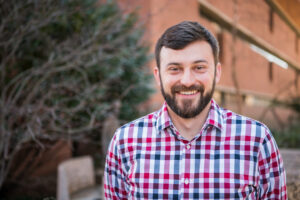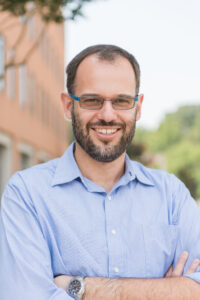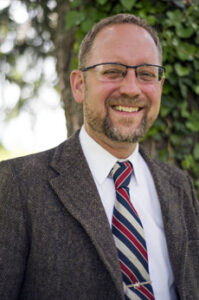In this public series, faculty members in the College of Natural and Mathematical Sciences present talks on a variety of interesting scientific topics. The college is committed to creating connections between UMBC and members of our local community, and the goal of this series is to give back by offering an opportunity for our neighbors to learn about the research happening in their backyards. Come to listen, learn, and maybe even laugh as our researchers and teachers introduce you to new worlds of information – no advanced scientific background is required.
Upcoming CNMS Science Discovery Series
“A ‘model’ world: How mathematical modeling underpins discoveries from engineering to medicine”
Presented by Justin Webster, associate professor of mathematics and statistics
 What do a famous bridge collapse, harvesting wind energy, and a common eye disease have in common? These—and so much more—can be usefully described by mathematical models. Models serve as powerful tools that can assist a curious person in understanding the world surrounding them. But what exactly is a model? What are models’ strengths and limitations? How are they used? Join us to learn how certain mathematical models can help us examine—and sometimes answer—lingering scientific questions, for instance regarding the phenomena mentioned above. Along the way, discover how applied mathematics underpins all of scientific inquiry, driving discovery in fields from engineering to medicine.
What do a famous bridge collapse, harvesting wind energy, and a common eye disease have in common? These—and so much more—can be usefully described by mathematical models. Models serve as powerful tools that can assist a curious person in understanding the world surrounding them. But what exactly is a model? What are models’ strengths and limitations? How are they used? Join us to learn how certain mathematical models can help us examine—and sometimes answer—lingering scientific questions, for instance regarding the phenomena mentioned above. Along the way, discover how applied mathematics underpins all of scientific inquiry, driving discovery in fields from engineering to medicine.
Tuesday, April 15, 2025, 5 – 6 p.m.
Information Technology & Engineering Building Room 104
Doors open at 4:30, refreshments to follow
Free parking; additional details upon registration
…and share with friends using these promotional materials.
Learn more about Dr. Webster’s work:
Justin Webster receives NSF grant to study mathematical models behind oscillation of plane wings, bridges, energy harvesters
The invisible power of ‘flutter’—from plane crashes to snoring to free energy
“Teaching them to think”: New course prepares students for success in proof-based mathematics
Past CNMS Science Discovery Series Events
Fall 2024
“Heat, power, action! From steam engines to quantum computers, thermodynamics drives technology transformation”
Presented by Sebastian Deffner, quantum physicist and associate professor of physics
This CNMS Science Discovery Series was generously sponsored by the Joseph F. Mulligan Memorial Lecture fund. The fund honors Dr. Mulligan, one of the founding members of UMBC’s Department of Physics.
 What do steam engines and quantum computers have in common? When each was invented, it was a poorly understood new technology with huge potential to influence the future of humanity. In the 18th century, the steam engine transformed transportation, manufacturing, and society at large forever. Then, in the 1820s, French military engineer Sadi Carnot discovered how steam engines converted heat energy into motion, defining the science behind the invention. In the process, he launched a new field of physics called thermodynamics. Since then, thermodynamics has underpinned technological milestones from the first automobiles to the latest smartphones. Today, thermodynamics is helping us understand emerging quantum technologies and use them to their full potential. Join us for a journey from Carnot’s steam engines to Sebastian Deffner’s quantum thermodynamics laboratory at UMBC, and into the incredible science that makes it all possible.
What do steam engines and quantum computers have in common? When each was invented, it was a poorly understood new technology with huge potential to influence the future of humanity. In the 18th century, the steam engine transformed transportation, manufacturing, and society at large forever. Then, in the 1820s, French military engineer Sadi Carnot discovered how steam engines converted heat energy into motion, defining the science behind the invention. In the process, he launched a new field of physics called thermodynamics. Since then, thermodynamics has underpinned technological milestones from the first automobiles to the latest smartphones. Today, thermodynamics is helping us understand emerging quantum technologies and use them to their full potential. Join us for a journey from Carnot’s steam engines to Sebastian Deffner’s quantum thermodynamics laboratory at UMBC, and into the incredible science that makes it all possible.
Learn about some of Dr. Deffner’s related work: Quantum computing, but even faster? UMBC researchers explore the possibilities with new NSF grant
“Life, But Not As We Know It”
Presented by Stephen Freeland, astrobiologist and professor of biological sciences
Are you wondering when or if we will encounter other life in the universe? How will we even know what to look for? On Earth, proteins form the basic structure of all living things. From amoebas to humans, all proteins are made by combining the same 20 building blocks – called amino acids – in different ways. Just as there are 26 letters in the modern English alphabet, these 20 amino acids make up an alphabet that enables and sustains all life on Earth. But what might the amino acid alphabet look like on another planet? And what Earthly applications might there be for an alternative amino acid alphabet? Join us for a talk about the work underway at UMBC, in collaboration with international partners, to build the world’s first example of an alien, or “xeno,” amino acid alphabet.
Learn about some of Dr. Freeland’s related work: UMBC’s Steve Freeland co-leads $1.8 million research grant to predict the biochemical foundations of life beyond Earth
